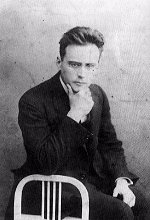| [naar
inhoudsoverzicht muziekgeschiedenis]
[naar
inhoudsoverzicht korte biografieen]
[naar Webern-
biografie
1]
[terug naar inhoud
Webern-biografie 2]
[naar
literatuurlijst]
inhoud:
Vienna at the turn of the century
Further
reading
|
Anton Webern (1883-1945) - biography
2

Anton von Webern
1902 - Study of musicology
Anton Friedrich Wilhelm von Webern was born in Vienna on December 3rd
1883 as son of a civil servant. Already during his school time, he
took music lessons and became acquainted with the works of leading contemporary
composers such as Richard Strauss and Gustav Mahler.
Already in 1899, he started to compose on late Romantic models,
in 1902 he began the study of musicology (professor Guido Adler) at the
University of Vienna and took his degree four years later with the publication
of Heinrich Isaak's „Choralis Constantinus II", chanting from the early
16th century.
1904 - Schönberg's student
In 1904, Webern became Arnold Schönberg's student and intensified
his compositional activity. In 1908, he composed his opus 1, the „Passacaglia"
for great orchestra which reminds od Johannes Brahms, followed by the double
canon for a cappella choir „Entflieht auf leichten Kähnen". With these
two still tonally orientated compositions Webern finished his studies with
Schönberg. But he continued - as well as his „schoolmate" Alban Berg
- to be attached to his teacher after the studies. Webern and Berg pleaded
in Vienna for the spread of the works of their teacher and did not shrink
from pointing out Schönberg's bad financial situation with collection
campaigns.
|